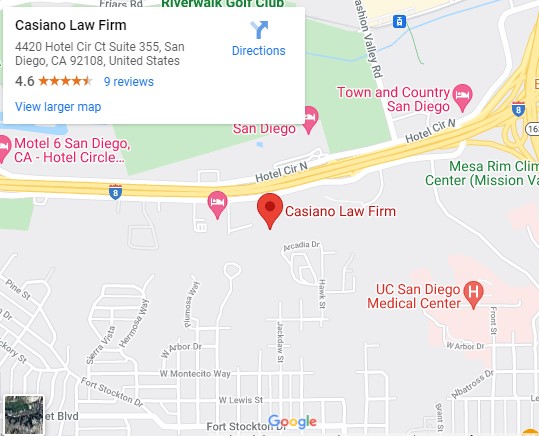If a loved one has just died and you are worried about how their estate plan was carried out or altered, you may be asking how to contest a trust in California. A trust contest is a type of trust litigation that focuses on the document’s validity or the way in which it was made or modified.
If a trust or will conflict is tearing your family apart, it is strongly advised that you get legal advice from the experienced San Diego trust litigation lawyers at Casiano Law Firm. Casiano Law Firm’s founder, Attorney Vincent Casiano, has extensive experience dealing with the trust and probate process. He helps clients deal with trust contest cases, wills contests, complex trust accountings, and charges of breach of fiduciary duty.
Reach out to him now to enjoy a No Charge Phone Consult!
Why do I need a Trust Litigation Lawyer in Southern California?
It is difficult to take action to invalidate a trust. If you try to handle your trust contest case on your own, it will be difficult to achieve a favorable outcome, especially if you are unfamiliar with the legal process. An experienced California trust litigation attorney can guide you through the whole process, from filing to trial. Your attorney will have a better grasp of your situation once the trial starts, in addition to a better knowledge of the legalities. This knowledge will provide you with crucial insight into the status of your case and also the timeline.
Aside from the practical benefits of hiring a trust contest attorney, you can be certain that the lawyer will be looking out for your best interests. Whether your relationship with a trustee is strained or you suspect your loved one was manipulated, you are most certainly in the middle of a very stressful situation. Hiring a San Diego trust litigation lawyer is an effective way to alleviate some of the stress you’re experiencing while you actively seek a favorable outcome.
How to Contest a California Trust?
The following are the steps on how to contest a Trust in California:
- First, speak with a knowledgeable trust contest attorney, who can help you in examining the facts of your trust contest case and decide if it is worthwhile to pursue, both financially and emotionally.
- Second, petition the San Diego county probate court where the trust is being managed (i.e., where the trustee is).
- Third, be certain that your contest is filed on time. In most cases, the successor trustee will submit a Notice of Irrevocability under California Probate Code section 16061.7, which establishes strict deadlines for filing your trust contest with the probate court. If you miss the deadline, you will almost certainly be prohibited from pursuing your claim.
- Fourth, rely on your attorney to examine potential sources of additional information and witnesses who will supply the evidence required to obtain a successful outcome in your trust contest case.
- Fifth, after you have all of the necessary information, you will be ready to mediate (an effort to settle) your trust contest case or take it to trial.
Valid Grounds for Trust Contests in San Diego, CA
Contesting California wills or trusts is often difficult since the court usually defaults to upholding the decedent’s final wishes as indicated in their most recent will or trust. However, if it is proven that the provisions of the document are invalid on a recognized ground, the court may order that the document be invalidated, which means asset distribution will be done in accordance with the state’s intestate succession laws or to a trust beneficiary under a prior valid version of the document if the deceased had executed one.
The following grounds for contesting a trust are allowed by the court:
Elder Abuse
The unpleasant truth is that undue influence often accompanies the financial exploitation of the elderly. As loved ones become older, they may have mental and physical limitations, rendering them susceptible to financial abuse by others who come into their life to “help” them.
When evidence reveals that elder abuse was committed with the intent of changing the provisions of a trust, a trust contest can be initiated to nullify the document. For instance, if it is discovered that a decedent’s new girlfriend withheld medicine or food in order to induce them to amend their trust in their favor, a trust contest would be necessary.
If the alleged abuse caused financial damage to the trust, not only can the trust assets that were lost be recovered from the abuser, but so can damages. In addition, if the abuse is effectively proven, the court may seek to have the part of the trust that includes the abuser as a beneficiary declared invalid.
Forgery
Does the decedent’s signature on a trust seem to be a crude copy? Suspicious situations like this might imply that a forgery has occurred. However, the court will not just accept your word for it. In most circumstances, expert evidence from a forensic handwriting analyzer is necessary to establish a decedent’s signature on a trust is falsified.
The deceased’s signature on the trust will be compared by the analyst to signatures on other documents that the deceased is known to have signed. If they do not match, the trust could be forged and will be declared invalid by the court.
Fraud
To set aside a trust based on fraud, it must generally be established that the deceased was willfully misled, coerced, or deceived into executing the trust. Fraud is often classified into two basic categories: fraud in the inducement and fraud in the execution.
Fraud in the Inducement
This occurs when a deceased person thinks they are creating a trust, but the contents of the trust document are the effect of the decedent being deceived by someone who will profit from the decedent’s deception.
For instance, a parent may be lied to by an adult child about their sibling’s financial security in order for the parent to give them a larger portion of the trust. This form of intentional fraud committed by a child for personal benefit comes under the category of fraud in the inducement.
Fraud in the Execution
This type of fraud happens when one party is deceived about the nature of the contract by the other party. This form of fraud could have occurred if the deceased was tricked into signing a trust document that included misrepresented terms or was deceived about the purpose of the trust document altogether.
For instance, if a grantor or testator has difficulty reading (i.e., they have bad vision or are illiterate) and they are told they are signing a power of attorney when in fact they are signing a trust, what is occurring is fraud in the execution.
Lack of Capacity
In California wills and trust disputes, it is common for the elder’s mental capacity at the time of execution to be called into question, whether because they were suffering from cognitive impairment owing to dementia or old age or from other mental problems or disabilities. Since trusts are often more complicated than wills, the level of competence necessary to sign a trust is often higher than the level of competence needed to sign a will.
Mistake
The margin for invalidating a trust due to a mistake is narrow. The defense of mistake is most often used when the deceased mistakes the document they were signing for anything other than a trust.
In order for a trust to be invalidated due to a mistake, it must be shown that the grantor signed the trust by mistake or was ignorant about the statutes governing trust execution.
Revocation
A trust is null and void if it is revoked by the creator of the trust.
A person may choose to destroy, amend, or replace a trust for a variety of reasons. For instance, the deceased may have divorced, remarried, or produced a child.
A will may usually be revoked by simply destroying, replacing, or modifying it, but rescinding a trust is a bit more complicated. If you want to revoke an estate planning document, you should consult with an experienced estate and trust attorney to verify you’re taking the right steps.
Undue Influence
When someone uses their position of trust and confidence to get someone else to do something they wouldn’t normally do, this is called undue influence. Undue influence takes place in the context of will and trust litigation when excessive persuasion is employed to persuade a person to amend their estate plan.
Because they often have trusted ties with seniors, many undue influence situations concern a family member such as a surviving spouse, a child, a caretaker, and fiduciaries. Most often, the party bringing the trust contest will have to establish that undue influence played a part in the trust getting signed.
Call a Trusted San Diego Trust Litigation Attorney
Casiano Law Firm cares about your future and wants to help you protect it. As most of his friends and clients call him, Vinny founded the Casiano Law Firm and the San Diego Elder Law and Estate Planning Firm in August of 2005.
He continuously works for clients’ best interests to get the best possible result for them and their families. He can help you if you need a trust or another estate plan, or if you want to contest one. Contact his law office now for a No-Charge-Phone-Consult!

